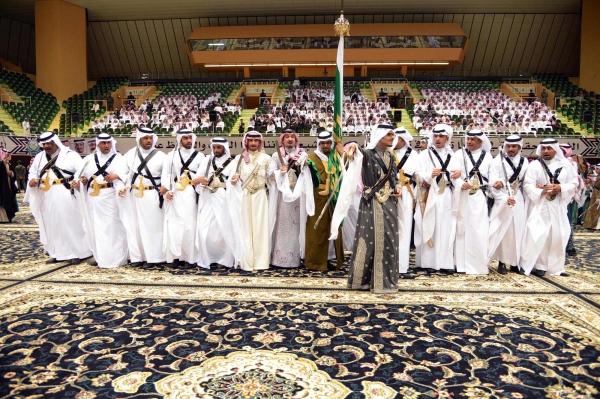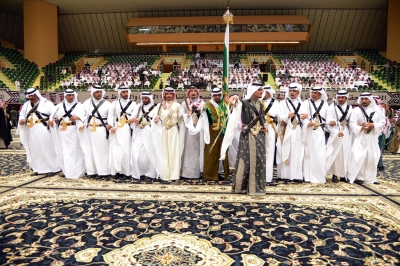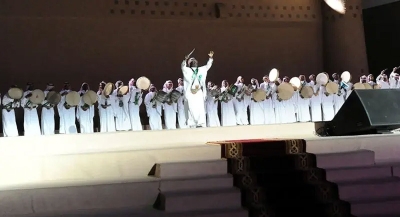

The Poet and Teacher in the Saudi Ardah play a significant role in the Saudi Ardah in the Kingdom of Saudi Arabia. The Ardah's two rows chant the Ardah war song, verse by verse alternately, relying on the poet who feeds verses to the rows or the teacher who conveys it from the poet to them. The Ardah, originally a "war dance," ignites the warriors' spirits and symbolizes the unity between the leader and his people. Performed by the warriors in front of their leader, it demonstrates their love for their land, sense of belonging, pride, loyalty, and dedication to their leader. The heroic poems recited during the Ardah showcase the leaders' glory and achievements, in addition to the fathers' sacrifices, heroism, and courage in defending their lands and celebrating victories.
Importance of the Saudi Ardah poet
The Ardah cannot be performed without the poet. When Fahd Bin Duhayyim was absent from one of the Ardah performances due to his illness, the Founding King, Abdulaziz Bin Abdulrahman Al Saud, ordered his presence, highlighting the poet's essential role in the Ardah. Prominent poets of the Saudi Ardah include Fahd Bin Duhayyim, Abdullah Bin Khamees, Suleiman Bin Hathoor, Mohammed Abdullah al-Qadi, Nasser Bin Zaid Bin Shanar, Saad Bin Harioul al-Subaie, and Mohammed al-Ouni.
Ardah poets have written some of the most famous poems of the Saudi Ardah, a tradition linked to Al Saud family before the establishment of the First Saudi State. Titles such as 'Nakhwat al-Auja' contributed to victories, as King Abdulaziz used them to inspire enthusiasm in his army to repel invaders. Therefore, the word al-Auja has retained its connotation of chivalry, courage, and boldness. Many enthusiastic poems have referred to it, such as "We are the people of al-Auja, we repel the adversary, and honor is gained by those who uphold its legacy." The term 'al-Nakhwa' refers to a call associated with a community or state to instill enthusiasm and pride among its people. 'Al-Auja' refers to ad-Dir'iyyah, located along the winding Wadi Hanifah.
The poem in the Saudi Ardah
The poem is one of the pillars and essential components of the Saudi Ardah. The dance is performed based on its structure. Therefore, the successful performance of the Saudi Ardah, with its melody and rhythm, depends on composing poetic content and figurative expressions that match the theme of enthusiasm. It, in turn, reflects on the performers' enthusiasm, boosting their morale and intensifying their
The poem in the Saudi Ardah touches on themes of pride and description and usually does not exceed ten verses of colloquial poetry. It can be from the long, medium, or short meter. The poem is recited by its author (the poet), who delivers each verse, which is then repeated by the Ardah rows according to a specific melody. The poem serves as the moral element that unites the Ardah and forms the basis for the dance. The theme of enthusiasm predominates in these poems due to their historical connection with wars, where they were used to motivate warriors.
The Ardah has old and contemporary poets, including Nasser al-Arini, Abdullah al-Subai, Mohammed al-Ouni, Fahd Bin Duhayyim, and Abdulrahman al-Buwardi. Abdullah Bin Khamees has documented their poems in his book (War Songs or Ardah Poetry).
Related quizzes
Related articles

